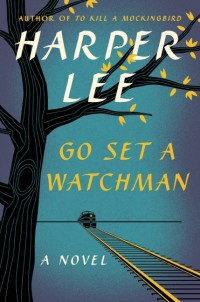Et tu, Atticus Finch? He's a changed and racist man in Harper Lee's new book

This is Atticus Finch?
In To Kill a Mockingbird, Atticus Finch stood for justice and truth in his defense a black man accused of the rape of white women. He has been a longtime inspiration and role model for lawyers.
But the Atticus Finch in Harper Lee’s novel Go Set a Watchman is a racist, the New York Times reports in a review of the book. He opposes integration. He once attended a Klan meeting. He complained about the NAACP in his state and described its lawyers as “standing around like buzzards.” He asked his daughter. “Do you want Negroes by the carload in our schools and churches and theaters? Do you want them in our world?”
The book, the Times says, is “a lumpy tale about a young woman’s grief over her discovery of her father’s bigoted views,” discovered on a trip home to Alabama after living in New York.
According to the Times reviewer: “The depiction of Atticus in Watchman makes for disturbing reading, and for Mockingbird fans, it’s especially disorienting. Scout is shocked to find, during her trip home, that her beloved father, who taught her everything she knows about fairness and compassion, has been affiliating with raving anti-integration, anti-black crazies, and the reader shares her horror and confusion. How could the saintly Atticus—described early in the book in much the same terms as he is in Mockingbird—suddenly emerge as a bigot?”
Another review by the Guardian acknowledges that Watchman “shatters the traditional reading of Atticus.” But the reviewer sees merit in the book, calling it “a pleasure, revelation and genuine literary event, akin to the discovery of extra sections from T S Eliot’s The Waste Land or a missing act from Hamlet hinting that the prince may have killed his father.”
Though the story line in Mockingbird is more gripping than Watchman’s, the Guardian says, the contents of Mockingbird are “sanitized” and Lee’s “linguistic playfulness” is gone, the Guardian says.
Go Set a Watchman was written before To Kill a Mockingbird. Lee’s editor at J.B. Lippincott, Tay Hohoff (her full name was Therese von Hohoff Torrey) rejected the manuscript, the New York Times reports in a separate story. She advised Lee during several drafts until the book was released as Mockingbird.
The Times describes Hohoff as “a strong-willed and forceful editor.” In a Lippincott corporate history, she described the book’s evolution. “After a couple of false starts,” she said, “the story-line, interplay of characters, and fall of emphasis grew clearer, and with each revision—there were many minor changes as the story grew in strength and in her own vision of it—the true stature of the novel became evident.”
Related article:
ABAJournal.com: “Law prof’s contrarian views about Atticus Finch are vindicated”



